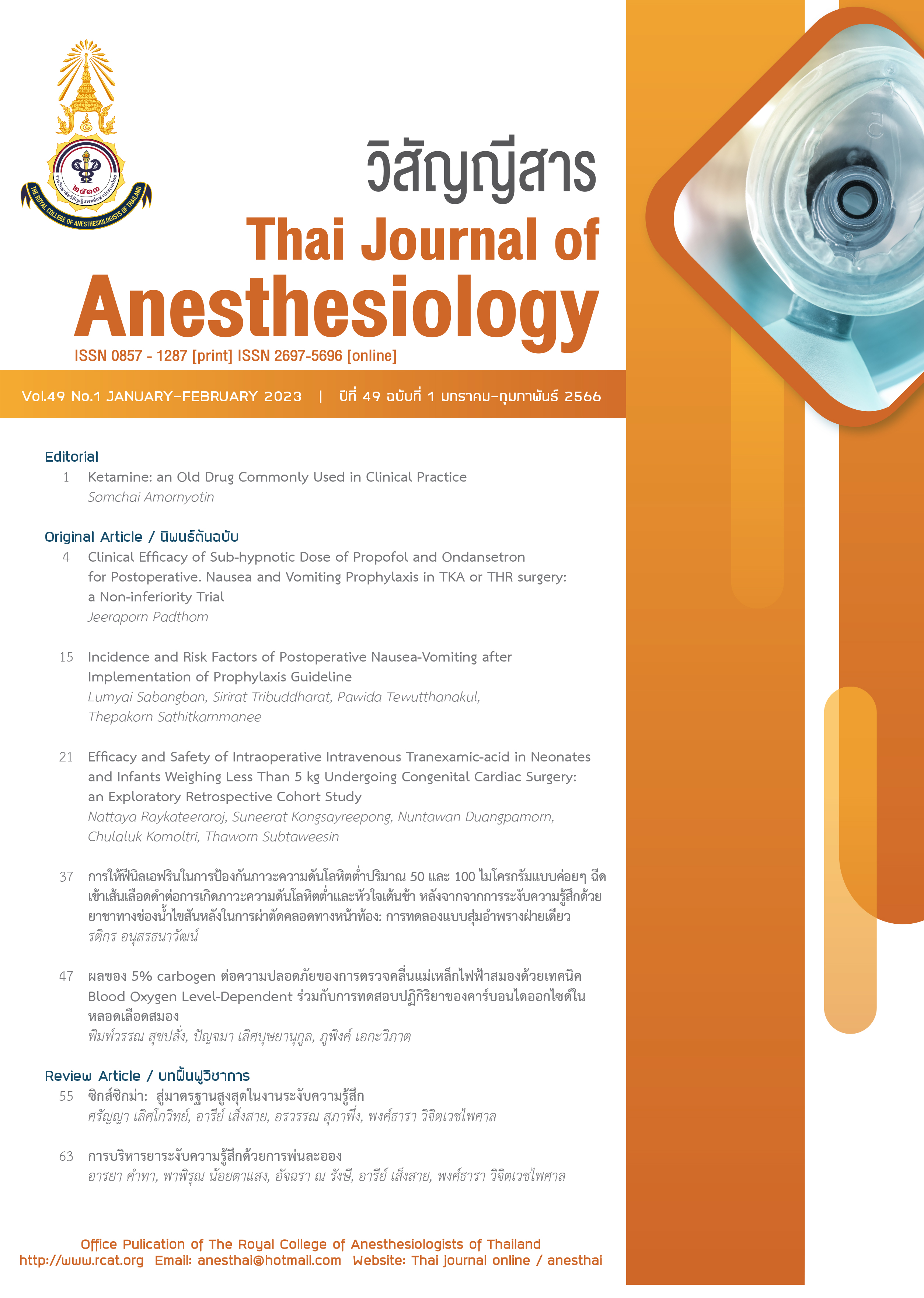Efficacy and Safety of Intraoperative Intravenous Tranexamic- acid in Neonates and Infants Weighing Less Than 5 kg Undergoing Congenital Cardiac Surgery: an Exploratory Retrospective Cohort Study
Main Article Content
Abstract
Background: Pediatric congenital heart diseases are associated with coagulation abnormalities, which are aggravated during cardiopulmonary bypass (CPB). There still have scarce information about the safety and efficacy of tranexamic acid (TXA) in neonates and infants’ weight < 5 kg. Objective: To determine the efficacy of intravenous TXA in neonates and infants’ weight < 5 kg undergoing congenital cardiac surgery about postoperative blood loss, intra- and 24 hours postoperative transfusion, and postoperative morbidity/mortality. Material and methods: A retrospective study was conducted between January 2015 and December 2021 in neonates and infants’ weight < 5 kg undergoing congenital cardiac surgery under CPB. Patients with history of seizure, stroke, preoperative acute kidney injury, bleeding disorder, and who received TXA in the ICU were excluded. Patients were divided into the controlled group (n=19) and the TXA group (n=103). Results: TXA group had significant lower postoperative blood loss at 12 hours but not 24 hours postoperative allogeneic transfusion. Single bolus TXA > 30 mg/kg before incision tended to decrease postoperative bleeding at 12 hours (b = -0.264; P=0.079). High dose TXA > 50 mg/kg didn’t increase the efficacy of TXA. TXA 60 and 82 mg/kg were associated with postoperative seizure and arterial thrombosis. Conclusion: Intravenous TXA showed efficacy in decreasing postoperative blood loss at 12 hours but not 24 hours postoperative allogeneic transfusion. A high dose (> 50 mg/kg) of TXA did not increase its efficacy. The postoperative seizure was associated with high dose TXA. An optimal dose of TXA is warranted for further study.
Article Details

This work is licensed under a Creative Commons Attribution-NonCommercial-NoDerivatives 4.0 International License.
References
Guzzetta N, Miller B. Principles of hemostasis in children: models and maturation. Paediatr Anaesth. 2011;21:3-9.
Kern FH, Morana NJ, Sears JJ, Hickey PR. Coagulation defects in neonates undergoing cardiopulmonary bypass. Ann Thorac Surg. 1992;54:541-6.
Chan AK, Leaker M, Burrows FA, et al. Coagulation and fibrinolytic profile of paediatric patients undergoing cardiopulmonary bypass. Thromb Haemost. 1997;77:270-7.
Siemens K, Sangaran DP, Hunt BJ, Murdoch IA, Tibby SM. Strategies for prevention and management of bleeding following pediatric cardiac surgery on cardiopulmonary bypass: a scoping review. Pediatr Crit Care Med. 2018;19:40-7.
Cholette JM, Faraoni D, Goobie SM, FerrarisV, Hassan N. Patient blood management in pediatric
cardiac surgery: a review. Anesth Analg. 2018;127:1002-16.
Zhang Y, Zhang X, Wang Y, et al. Efficacy and safety of tranexamic acid in pediatric patients undergoing cardiac surgery: a single-center experience. Front Pediatr. 2019;7:181.
Chauhan S, Bisoi AA, Kumar N, et al. Dose comparison of tranexamic acid in pediatric cardiac surgery. Asian Cardiovasc Thorac Ann. 2004;12:121-4.
Pasquali SK, Li JS, He X, et al. Comparative analysis of antifibrinolytic medications in pediatric heart surgery. J Thorac Cardiovasc Surg. 2012;143:550-7.
Willems A, De Groote F, Dumoulin M, Fils JF, Van der Linden P. Aprotinin versus tranexamic acid in children undergoing cardiac surgery: an observational study. Eur J Cardiothorac Surg. 2019;56:688-95.
Hasegawa T, Oshima Y, Maruo A, et al. Intraoperative tranexamic acid in pediatric bloodless cardiac surgery. Asian Cardiovasc Thorac Ann. 2014;22:1039-45.
Faraoni D, Willems A, Melot C, De Hert S, Van der Linden P. Efficacy of tranexamic acid in paediatric cardiac surgery: a systematic review and meta-analysis. Eur J Cardiothorac Surg. 2012;42:781-6.
Siemens K, Sangaran DP, Hunt JB, Murdoch IA, Tibby SM. Antifibrinolytic drugs for the prevention of bleeding in pediatric cardiac surgery on cardiopulmonary bypass: a systematic review and meta-analysis. Anesth Analg. 2022;134:987-1001.
Zou Z, He L, Yao Y. Tranexamic acid reduces postoperative blood loss in Chinese pediatric patients undergoing cardiac surgery. A PRISMA-compliant systematic review and meta-analysis. Medicine. 2022;101:e28966.
Maeda T, Sasabuchi Y, Matsui H, Ohnishi Y, Miyata S, Yasunaga H. Safety of tranexamic acid in pediatric cardiac surgery: a nationwide database study.
J Cardiothorac Vasc Anesth. 2017;31:549-53.
Koster A, Börgermann J, Zittermann A, Lueth JU, Gillis-Januszewski T, Schirmer U. Moderate dosage of tranexamic acid during cardiac surgery with cardiopulmonary bypass and convulsive seizures: incidence and clinical outcome. Br J Anaesth. 2013;110:34-40.
Hodgson S, Larvin JT, Dearman C. What dose of tranexamic acid is most effective and safe for adult patients undergoing cardiac surgery? Interact Cardiovasc Thorac Surg. 2015;21:384-8.
Guo J, Gao X, Ma Y, et al. Different dose regimes and administration methods of tranexamic acid in cardiac surgery: a meta-analysis of randomized trials. BMC Anesthesiol. 2019;19:129.
Dennhardt N, Sümpelmann R, Horke A, et al. Prevention of postoperative bleeding after complex pediatric cardiac surgery by early administration of fibrinogen, prothrombin complex and platelets: a prospective observational study. BMC Anesthesiol. 2020;20:302.
Grassin-Delyle S, Couturier R, Abe E, Alvarez JC, Devillier P, Urien S. A practical tranexamic acid dosing scheme based on population pharmacokinetics in children undergoing cardiac surgery Anesthesiology. 2013;118:853-62.
Wesley MC, Pereira LM, Scharp LA, Emani SM, McGowan FX Jr, DiNardo JA. Pharmacokinetics of tranexamic acid in neonates, infants, and children undergoing cardiac surgery with cardiopulmonary bypass. Anesthesiology. 2015;122:746-58.
Gertler R, Gruber M, Grassin-Delyle S, et al. Pharmacokinetics of tranexamic acid in neonates and infants undergoing cardiac surgery. Br J Clin Pharmacol. 2017;83:1745-57.
Zhang Y, Jia Y, Shi J, et al. Safety and efficacy of tranexamic acid in paediatric cardiac surgery: study protocol for a double-blind randomised controlled trial. BMJ Open. 2019;9:e032642.
Kidney Disease: Improving Global Outcome (KDIGO) Acute Kidney Injury Work Group. KDIGO clinical practice guidelines for acute kidney injury. Kidney Int Suppl. 2012;2:1-138.
Al-Shaqsi SZ, Senkaiahliyan S, Forrest CR, Der TD, Phillips JH. Efficacy of tranexamic acid in pediatric craniofacial and orthognathic surgery: a meta-analysis. FACE. 2022;3:59-65.
Heyns M, Knight P, Steve AK, Yeung JK. A single preoperative dose of tranexamic acid reduces perioperative blood loss: a meta-analysis. Ann Surg. 2021;273:75-81.
Faraoni D, Rahe C, Cybulski KA. Use of antifibrinolytics in pediatric cardiac surgery: where are we now? Pediatr Anesth. 2019;29:435-40.


